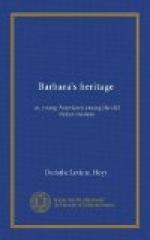But to-day there was a chill upon him. He had before been confident of the future. It must not, should not disappoint him, he had said to himself again and again. Somehow he was not now so sure of himself and it. There seemed a mystery before him. The way that had always before seemed to open to his will refused to disclose itself. How could he win the affection of this noble girl, whose life already seemed so full that she felt no lack, who was so warm and generous in her feelings to all, so thoroughly unselfish, so wholesome, so lovable? How he did long to make all her wishes centre on him, even as his did upon her!
But Barbara’s ideals were high. She would demand much of him whom she could love. Only the other day he had heard her say in a voice deep with feeling that money and position were nothing in comparison with a life that was ever giving itself to enrich others. Whom did she mean? he wondered. It seemed as if she knew some one who was even then in her mind, and a fierce jealousy sprang up with the thought. She surely could not have meant him, for he had never lived for any other than himself, nor did he wish to think of anything but himself. He wanted to get well and to have Barbara love him. Then he would take her away from everybody else and lavish everything upon her, and how happy would he be! Could he only look into the future, he thought, and see that this was to come, he would ask nothing else.
Poor Howard! Could the future have opened before his wish never so little, how soon would his restless, raging emotions have become hushed into a great silence!
* * * * *
A few evenings afterward, as they were all sitting together in the library, and Howard with them, Mr. Sumner, knowing that the young people had been reading and talking of Ghirlandajo and Botticelli, said that perhaps there would be no better time for talking of these artists than the present.
“With Masaccio,” he continued, “we have begun a new period of Italian painting,—the period of the Early Renaissance. All the former great artists,—Cimabue, Giotto, and Fra Angelico, whom we have particularly studied,—and the lesser ones, about whom you have read,—Orcagna, Taddeo Gaddi, and Uccello, the bird-lover (who gave himself so untiringly to the study of linear perspective),—belong to the Gothic period, literally the rude period; in which, although a steady advance was made, yet the works are all more or less very imperfect art-productions. All these are wholly in the service of the Church, and are painted in fresco on plaster or in tempera on wood. In the Early Renaissance, however, a new impulse was seen. Artists were much better equipped for their work, nature-study progressed wonderfully, anatomy was studied, perspective was mastered, the sphere of art widened to take in history, portraits, and mythology; and in the latter part of this period, as we shall see, oil-painting was introduced.”




